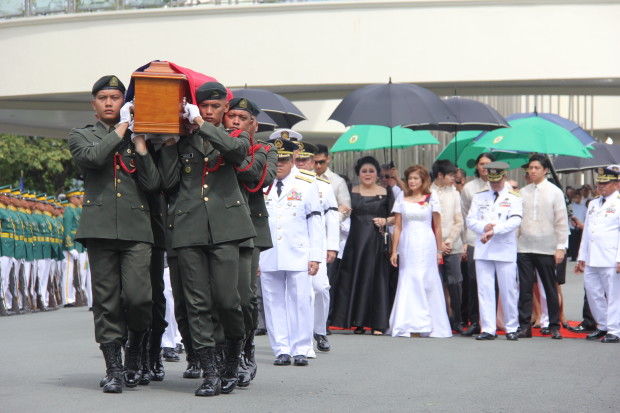What did they bury at Libingan ng mga Bayani?
Why was the casket so small? Were the remains really inside?
The rush and secrecy that surrounded the burial of deposed strongman Ferdinand Marcos has fueled speculation about whether his remains were really buried at Libingan ng mga Bayani on Friday.
“I am not against [the] burial but can we just stop the lies about [the] wooden child coffin … was President Marcos buried earlier?” asked Twitter user Kathy (@WoolbrightKathy), tagging both the official accounts of Marcos’ children Imee and Ferdinand “Bongbong” Marcos Jr.
User KristineLaeBerongoy (@laedberongoy) had the same question, tweeting with “cry” emojis: “I’m still wondering what’s inside Marcos’ coffin in his burial earlier.”
Several others made their own guesses. User tammybbanate (@thebabblebee), who is against the burial, was curious about the size of Marcos’ wooden coffin.
Article continues after this advertisement“Too narrow and small. No body? Just bones?,” she said.
Article continues after this advertisementUser Val Gravy (@valgraveeee) twitted the Marcoses in her post: “The casket is also [probably] loaded with Marcos family’s conscience. It looks empty.”
Wax figure
A GMA News report on Friday afternoon showed that Marcos’ supposed preserved body remained at the Ferdinand E. Marcos Presidential Center in Batac City, Ilocos Norte at the time the burial was taking place in Taguig City.
By Saturday, the mausoleum where the remains were kept was closed, even as tourists continued to flock to the center, a favorite destination in Ilocos tours.
Decoy
A media officer for Imee Marcos, Jun Gudoy, however sought to quell conspiracy theories by explaining that the one that was caught on television was actually a wax replacement meant to prevent an expected panic among Ilocanos.
“The wax figure there was actually a decoy,” Gudoy said. “The body was no longer there on Friday. They put another one as a decoy to people won’t notice and cause panic.”
The plan was not meant to stir confusion, Gudoy said, but was in keeping with the Marcos family’s wish to keep the burial rites “private and simple.”
Marcos died in exile in 1989, three years after he was ousted in a “people power” uprising. The body was kept in a refrigerated crypt since 1993.
Imelda Marcos has often been photographed visiting the place and planting a kiss on the glass encasement.
Chicanery
Marcos’ remains were airlifted to Manila and given a hero’s burial, just 10 days after the Supreme Court affirmed President Duterte’s approval of presidential interment rites for the tyrant.
For human rights lawyer Edre Olalia, the speculation may not be farfetched.
“Given the dictator and his family’s penchant for lies, deception and chicanery, as if it were second nature to them, it won’t be surprising if such a bizarre idea turns out to be true,” said Olalia, Secretary-General of the National Union of People’s Lawyers.
“But that is not the point. Regardless what is in there, what the tyrant’s family wanted was the symbolism and message that they are squeaky clean and would want to complete their political rehabilitation and historical revisionism,” he said./rga
RELATED VIDEO
